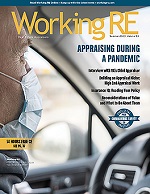 |
“One of the best courses that I have had in 17 years!” -Amy H
>> OREP E&O |
OREP/WRE Coronavirus Appraiser Blog
Coronavirus Appraiser Survey
Editor’s Note: This story is reprinted from the current print edition of Working RE magazine, mailing now. (Am I a Working RE Subscriber?)
Building an Appraisal Niche:
High-End Appraisal Work
By Isaac Peck, Editor
There has been a fair amount of doom and gloom in the appraisal industry, especially among residential appraisers. With all of the fanfare about bifurcated appraisals, as well as the fact that both Fannie Mae and Freddie Mac are now issuing appraisal waivers on roughly 10 percent of all residential refinance and purchase mortgage applications, appraisers who are currently relying on traditional 1004 appraisals for 100 percent of their work would seem to have a valid reason for being concerned.
And yet, there continues to be a subset of the appraiser community who have enjoyed success weaning themselves off residential 1004 assignments and who consistently encourage their fellow appraisers to diversify and do likewise. The path that each appraiser takes to build a diversified appraisal business and carve out their own niche varies but in each case, the diversified and/ or specialized appraiser is typically rewarded with better clients, higher fees, and more rewarding, challenging work.
Jason Fischman, SRA, AI-RRS, ASA, IFA, AGA, RAA, MNAA, HMS, GREEN and Chief Valuation Officer at Appraisal Evaluations, Inc. is one such appraiser who has developed a niche of appraising high-end, luxury property. With an office based in Beverly Hills, Fischman works right in the heart of Los Angeles’s luxury real estate market. In 2019, Fischman says he appraised more than $1.5 billion in real estate in aggregate value. Here’s his story.
Getting Started
Fischman started his appraisal career as a staff appraiser in 1989 and went on to hold a variety of senior roles at a handful of local, regional and national appraisal firms before going into business for himself in the early 2000s. With a partner, Fischman built a profitable appraisal firm with a number of appraisers working for him. However, in 2008, as real estate values were decimated and the market came grinding to a halt, Fischman’s firm followed suit and he was forced to start over. While running his larger appraisal firm prior to 2008, he was mainly reviewing his staff’s work and managing the office, but as work slowed he was forced to reinvent himself as an appraiser. “I ended up starting a new company in 2008 and began signing up with AMCs. I submitted my first report and got my first revision request back. The AMC sent me back eight to ten items that they wanted me to revise. I was a little taken aback at first. I had seen underwriting conditions but never something this arbitrary,” says Fischman.
However, instead of refusing to comply or swearing off AMCs, Fischman took it as an opportunity. “I saw it as an opportunity to raise my standards. I created a running checklist of things that came back with revision requests and I set a goal of not having any revision requests in a particular week, and then I’d try to go a month without a revision request, and so on. I created a list for every client, so I was really trying to deliver on my clients’ requirements. I treated the most basic assignments like they were multi-million dollar properties,” Fischman says.
The result is that clients began noticing Fischman’s high quality of work and trusting him with highervalue assignments and more specialized work. “Even though I was only doing basic residential appraisals, I did every assignment like it was high-end work. Little by little, reviewers and assigners noticed and I gradually began getting assignments with higher complexity and higher-end properties. There was a bit of a learning curve but as I got into it, it started to make more sense on a dollar per hour basis,” says Fischman.
High-End Niche
Today, Fischman has built up another successful appraisal firm that includes an operations manager, two assistants, offshore support and six appraisers. While Fischman’s firm does a variety of work, including traditional residential mortgage work, he is focused almost exclusively on high-end, residential properties. His average appraised value is roughly $8 million, but he says he’s open to assignments ranging from $1 million to well over $100 million. “My primary coverage areas are Beverly Hills, Brentwood, Bel Air, Holmby Hills, Malibu, Santa Monica and other affluent sections of Los Angeles. My personal client list ranges from banks, hard-money lenders, attorneys, trusts, CPAs, individuals, and a handful of specialized AMCs,” says Fischman.
One of the things that Fischman likes most about the type of work that he does is the variety of the properties he gets to see, and of course, all of the features that come with high-end real estate. “Each property is very different and there are a lot of nuances in each neighborhood that I need to be familiar with. I have always been a fan of architecture and I’m always amazed at the different styles of each property. I get to be in homes that most people only get to see on television. It is amazing to be entrusted with that kind of high profile work. I also like the analysis part of it, trying to solve the problem. I’m very passionate about giving the client the answers they’re looking for,” says Fischman.
In terms of a typical assignment, Fischman says they do take much longer but the fees are comparatively a lot higher as well. “I spend a lot more time (comparatively) on the subject inspection and the report. The total aggregate square footage that I measured in 2019 was roughly one million. I take all the measurements on my phone using mobile software. I’ve spent five to six hours at a single property measuring a 40,000+ sq. ft. mansion. On the most complicated reports, it can take me 40 hours to complete a given assignment. Sometimes I’ll bring someone with me if the property warrants it,” says Fischman.
While Fischman was careful not to discuss his specific fees so as not to alert his competitors, he said he believes that $100 per hour is a good target for appraisers to shoot for, and in his experience, higher is definitely possible.
Client expectations are also different from the typical residential appraisal. “Clients for this type of work want detail; they want a full understanding of what the property is and how it compares in the marketplace. Oftentimes they will hire two appraisers, get two independent opinions of value, then reconcile the reports to make sure the obvious things are in alignment. They also expect white glove treatment. They want to get value for their dollars spent. They don’t want to chase you down for status updates. When they send you an engagement letter, they expect you to read it. If they ask for something out of the ordinary, we deliver it. As long as it is legal, moral and ethical, we deliver what the client wants,” reports Fischman.
For appraisers hoping to get away from the 1004, high-end properties may present some disappointment. Fischman reports that many high-end properties are still done on a 1004 appraisal form. “For very, very high-end work where the values get really up there, I typically recommend to the client that we do it on a narrative form,” Fischman says.
Some of the jumbo mortgages are sold to Fannie Mae, Fischman believes, but many are also kept in the lender’s private portfolio, depending on the size of the mortgage. “For some of the larger, customized loans being done, the lender can’t just say goodbye to it, so they definitely look at the loan and the property very carefully,” Fischman reports.
Just like when Fischman started working with AMCs, he says he still uses checklists to make sure he’s meeting all the clients’ needs. “We have a checklist for every client that we work with. We record anything they like to see, or specific requirements. I may miss something the first time, but it won’t happen twice. The work that we’re entrusted with is a privilege, I always treat it like a privilege,” says Fischman.
Advice for Appraisers
In terms of his advice to other appraisers who are looking to develop a niche or specialization outside of routine 1004 appraisal work, Fischman says it starts with doing your very best work for your clients. “In any work that I do, I always give it my best. I always approach everything with that mindset. Anytime you’re doing any type of niche work, when you receive requests for clarifications or revisions, I would look at those requests as an opportunity to improve, to communicate better and to become a better appraiser,” says Fischman.
An example that Fischman offers is a client he was working for around Thanksgiving 2019. “I was appraising a very high-end property, nine figures plus, and the client had some concerns and a long list of things they wanted me to discuss,” Fischman says. “I told them that we needed to get on a phone call. I went point by point and explained to them what the situation was; I followed up with that in writing, dealing with all their concerns. It was a five or six hour process, but they got the answers they were looking for. They said some very complimentary things after that and were very pleased with my work,” says Fischman.
Because Fischman gradually transitioned into his niche of high-end homes, he says he never did any proactive marketing into the space, but that once he realized that he was establishing himself in the niche, he began to promote it. “All of our marketing has been word of mouth—telling anyone who would listen—appraisers, clients and potential clients; putting it on my resume, website, email signature, and everything intended for the public eye. I use aggregate valuation when I’m talking to clients and Realtors®— I track the total value of how much real estate I’m appraising. Realtors® always talk about their annual sales volume, so when I tell people I appraised $1.5 billion in 2019, people take notice,” reports Fischman.
These same types of metrics can be translated to other types of work too, according to Fischman. “For the appraisers doing relocation work, they might talk about average variance from eventual selling price and promote that as their eventual metric. Speak in terms that the client will understand and communicate it in a way that will impress them,” Fischman advises. Lastly, appraisers looking to expand their horizons and find higher paid, more fulfilling work should look to their own professional development and try to be constantly learning. “There are a lot of potential niche areas in appraising; I just have one. Whatever you pursue, I recommend that you learn everything that you possibly can pertaining to that niche. Start with the state where you’re licensed, but always do more than what the state requires for continuing education. I do two to three times more education than the state requires. Secondly, network with other appraisers who have a similar niche, either your local competitors or maybe appraisers farther away who you can speak more freely with,” says Fischman.
One way that Fischman began networking with appraisers is by joining appraiser Dustin Harris’ Mastermind Group. “As my friend Dustin (the Appraiser Coach) says, I needed to ‘get out of my appraiser cave.’ So I started working with Dustin several years ago and he really helped me get clarity on some of the things I was doing. He has been tremendously helpful as a coach and as a friend. I really absorbed the types of things he was doing with technology and human resources, and it inspired and helped me to build my own appraisal firm with other appraisers, office assistants, and even remote help. My business has come a long way and is thriving after working with Dustin. Networking with other appraisers and changing your perspective can work wonders in your business,” says Fischman.
>> Upcoming Two-Part Webinar:
Condition Adjustments: How the Cost Approach Helps
“This was my first time to listen to one of Richard Hagar’s courses and I wish I had done so much sooner! Very valuable info and easy to understand.” -RM
>> Join the Discussion at OREP/Working RE’s Coronavirus (COVID-19) Discussion and Resource Page/a> where you can share your thoughts, experiences, advice and challenges with fellow appraisers.
>> Take OREP/Working RE’s Coronavirus: State of the Appraisal Industry survey here.
About the Author
Isaac Peck is the Editor of Working RE magazine and the Vice President of Marketing and Operations at OREP.org, a leading provider of E&O insurance for appraisers, inspectors and other real estate professionals in 50 states. He received his master’s degree in accounting at San Diego State University. He can be contacted at isaac@orep.org or (888) 347-5273.
Sign Up Now! $119 (7 Hrs)
OREP Insured’s Price: $99
>Opt-In to Working RE Newsletters
>Shop Appraiser Insurance
>Shop Real Estate Agent
Insurance
Send your story submission/idea to the Editor:
isaac@orep.org




